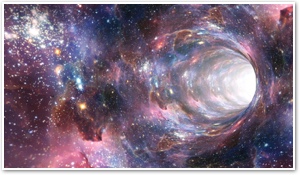What's a Greater Leap of Faith: God or the Multiverse?
- BRIAN G. KEATING
How did we get here?
 I mean, literally. Not just you and me, but the whole shebang. How is any kind of life possible? The universe is a hostile place — solar flares, cosmic rays, asteroids flying about. The odds against our existence are truly astronomical.
I mean, literally. Not just you and me, but the whole shebang. How is any kind of life possible? The universe is a hostile place — solar flares, cosmic rays, asteroids flying about. The odds against our existence are truly astronomical.
Take it from me — I'm an astrophysicist. My job is to look out into space, at stars and galaxies, trying to answer these basic how-did-the-universe-come-to-be questions.
Well, those who have a religious faith have an answer: God.
The earth's distance from the sun, the size of the atom, and a thousand other things large and small that allow us to live and to breathe and to think all seem perfectly tuned for our existence. To many, this design suggests a designer. But from a purely scientific point of view, the faithful have a big problem: They can offer no indisputable proof for this belief.
Because of the lack of hard evidence, it's probably not surprising that over 70% of the members of the National Academy of Sciences declare themselves to be atheists.
But they have a big problem, too.
Absent a creator, how do they account for the existence of the universe, of planet earth, of human consciousness? How do they account for the existence of …anything?
Well, turns out they have an answer. And it's become all the rage in scientific circles.
It's called the "multiverse," and according to many scientists, our universe isn't the whole ball game; far from it. These scientists argue that there are an awful lot of universes out there — not just one or two, but an infinite number.
Let me explain:
13.8 billion years ago, there was a Big Bang — from something unimaginably small (we don't know exactly what), the universe exploded into existence. How did it happen? Why did it happen? Doesn't matter. 'Cause it happened.
Immediately after the Big Bang, the universe underwent a rapid expansion. Think of a gush of bubbles exploding from a seriously shaken soda can just after it's popped open. Cosmologists call this the Theory of Inflation.
As the universe inflates and expands — the bubble universes grow and separate to become their own distinct entities, each with their own unique properties. In other words, new universes are spawned — and not just a handful…an infinite number of them.
Some of these universes would be too cold for life, and some too hot. But, with an infinite number, surely one is bound to get it just right. In short, you and I are just an accident that, given enough universes, was inevitable.
In short, a vast number of the world's most eminent scientists believe in something that hasn't been, and in all likelihood, will never be proven.
But, wait — there's more. Because there are so many universes, it's very likely, according to the multiverse scenario, that everything that could possibly happen does happen in one universe or another. That girlfriend who broke up with you? You're married to her in another universe.
Does this sound a bit far-fetched? A little science-fictiony?
Well, not to Nobel Prize-winning scientists like Steven Weinberg or the famed cosmologist Stephen Hawking, as well as a myriad of others who whole-heartedly endorse it.
But here's what's really surprising: They endorse it knowing there's not a single shred of hard scientific evidence that supports it. And how can there be? There's no way we can access another universe.
In short, a vast number of the world's most eminent scientists believe in something that hasn't been, and in all likelihood, will never be proven. How does that sound to you?
Probably the same way it sounds to the distinguished physicist Paul Davies:
"Invoking an infinity of unseen universes to explain the unusual features of the one we do see is just as [made up] as invoking an unseen Creator. The multiverse theory may be dressed up in scientific language, but in essence it requires the same leap of faith."
Or, as G.K. Chesterton quipped: "When men stop believing in God, they don't believe in nothing; they believe in anything." For multiverse believers, this is literally true: the same scientists who reject God's existence due to lack of evidence pin their hopes on a theory so all-inclusive and vague it can never be refuted.
Those who believe God created the universe are intellectually honest enough to admit that they do so on the basis of faith. But those who believe in the multiverse are also keeping the faith. They just don't admit it.
So, let me ask you, who's taking the bigger leap?
I'm Brian Keating, Professor of Physics at the University of California, San Diego, for Prager University.


 This is J. Fraser Field, Founder of CERC. I hope you appreciated this piece. We curate these articles especially for believers like you.
This is J. Fraser Field, Founder of CERC. I hope you appreciated this piece. We curate these articles especially for believers like you.
Please show your appreciation by making a $3 donation. CERC is entirely reader supported.

Acknowledgement
 Brian G. Keating. "What's a Greater Leap of Faith: God or the Multiverse?" Prager University (April 24, 2018).
Brian G. Keating. "What's a Greater Leap of Faith: God or the Multiverse?" Prager University (April 24, 2018).
PragerU's five minute videos are conservative sound bites, providing talking points to over 100 million people a year.
Support Prager University with a donation here.
The Author
 Brian G. Keating is Professor of Physics at the University of California at San Diego and an astrophysicist at the Center for Astrophysics & Space Sciences (CASS). He is the author of Losing the Nobel Prize: A Story of Cosmology, Ambition, and the Perils of Science's Highest Honor.
Brian G. Keating is Professor of Physics at the University of California at San Diego and an astrophysicist at the Center for Astrophysics & Space Sciences (CASS). He is the author of Losing the Nobel Prize: A Story of Cosmology, Ambition, and the Perils of Science's Highest Honor.


